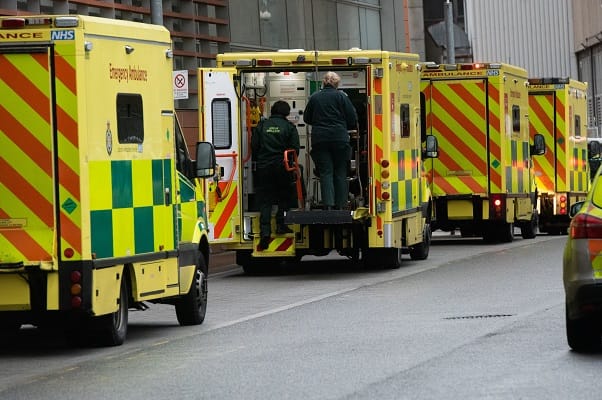A paramedic has told of the horrors the NHS have as wards are struggling with a “bed crisis” and patients are waiting in ambulances queued up outside a hospitals.
Due to the lack os space in hospitals patients who are suffering with “smoke inhalation” following a house fire another who was “red flagged with sepsis” and many other serious conditions are being treated inside ambulances.
Often there are as many as 17 queued up waiting for doctors to come out and treat people.
Health bosses in Greater Manchester have been forced to admit that currently the NHS are in an “exceptional” predicament right now.
A paramedic told Manchester Evening News, “They don’t even let us into the hospital with our patients, we’re expected to keep them in the back of the ambulance.
“The staff come out, they might do bloods on the back of the ambulance, a doctor might come out and assess them on the back of the ambulance.
“So, the bed status is the biggest thing that we hear about, but we also know that because hospitals are struggling with staff shortages, [the hospitals are] basically using the ambulances and the crews as an extension of their department.”
The paramedic added, “It’s ridiculous, honestly.
“There can be 17 ambulances parked up at any one time, and that’s at one hospital.
“We have had people who have been flagging with red flag sepsis, they have been left outside.
“They’re poorly.
“I took a smoke inhalation after a house fire down to Royal Oldham, they waited under the canopy for six-and-a-half hours, outside. He was on oxygen throughout, we were basically pinching oxygen cylinders off each other’s vehicles to keep him oxygenated.”
The paramedic who spoke anonymously said, “The oldest job I went to on Wednesday (October 20) was 18-and-a-half hours old.
“It was an elderly female who had a fall, and was believed to have a broken ankle. She couldn’t walk, she couldn’t get herself to hospital, very elderly.
“She had been assisted into a chair by one of her neighbours and she had been left there, overnight, waiting for an ambulance.
“Another job I went to was only 14 minutes old.
“It genuinely does depend on what they are saying on the phone.
“Obviously, the highest coded calls, we’re never going to get to them in time, so to speak.
“We all recognise that we are failing with the time frames.
“But there could be jobs 24 hours old that are still waiting on ambulances.”
Non-emergency patients can be left waiting for more than “24hours” as ambulances are not being sent to them.
Sarah Price, interim chief officer of the partnership of the Greater Manchester Combined Authority (GMCA) said, “The NHS in Greater Manchester is facing an exceptionally difficult period as we tackle the backlogs of people waiting for care that have built up during the pandemic, delivering two vaccination programmes (Covid-19 and flu) and starting winter with a rise in Covid cases.
“Increased pressure on ambulance services, which includes 111 calls, reflects increased pressure in other parts of the NHS.
“We understand this is a worrying time for people and places extra strain on all NHS and care staff. Patient safety will always be our highest priority. This means the ambulance service and emergency departments (A&E) will treat the sickest patients first and others may face a longer wait.
“Reducing waiting times is a priority and our plans to improve this include additional support for 999 calls to increase call handling capacity by trained professionals and support for mental health calls to ensure people can access support from the right person, in the right place.
“Hospitals in Greater Manchester are working to increase the number of beds, improve patient flow and facilitate timely discharge. At the same time, we are finalising plans to use national funding to improve access to general practice for patients.
“It’s really important to recognise the efforts of NHS and care staff across all of Greater Manchester who are working incredibly hard to provide the best care and support possible. Our staff are working tirelessly to ensure we keep our patients safe whilst responding to high levels of demand.
“Going to the right place for treatment has never been more important. Everyone can help us reduce delays by only calling 999 or going to emergency departments (A&E) for life-threatening emergencies and contacting NHS 111 online or by phone for other medical assistance and advice.”






Leave a Comment